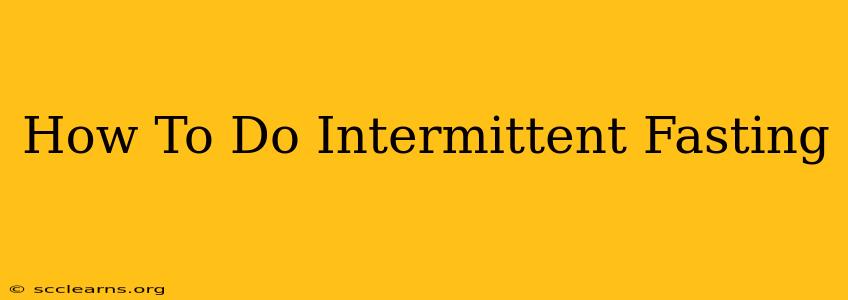Intermittent fasting (IF) is a popular eating pattern that cycles between periods of eating and voluntary fasting on a regular schedule. It's not about what you eat, but when you eat. This guide will walk you through the basics of intermittent fasting, helping you understand how to safely and effectively incorporate it into your lifestyle.
Understanding Intermittent Fasting Methods
There are several different methods of intermittent fasting, each with its own approach to eating windows and fasting periods. The most common include:
-
The 16/8 Method: This involves fasting for 16 hours and restricting your eating to an 8-hour window each day. For example, you might eat between 12 pm and 8 pm, fasting overnight and in the early morning. This is a popular starting point for beginners due to its relative simplicity.
-
The 5:2 Diet: This method involves eating normally for five days of the week and significantly restricting your calorie intake (around 500-600 calories) on two non-consecutive days.
-
Eat Stop Eat: This involves a 24-hour fast once or twice a week.
-
Alternate-Day Fasting: This involves fasting every other day. This method is more extreme and generally not recommended for beginners.
Choosing the right method for you depends on your lifestyle, preferences, and health goals. It's crucial to start slowly and gradually increase the fasting duration as your body adapts.
Benefits of Intermittent Fasting
While more research is needed, intermittent fasting has shown promise in several areas:
-
Weight Loss: By reducing your overall calorie intake, intermittent fasting can lead to weight loss. It can also boost metabolism and increase fat burning.
-
Improved Insulin Sensitivity: Studies suggest intermittent fasting may improve insulin sensitivity, reducing the risk of type 2 diabetes.
-
Cellular Repair: The fasting periods may trigger cellular repair processes, potentially slowing down aging and reducing the risk of chronic diseases.
-
Brain Health: Some studies indicate that intermittent fasting may improve brain function and protect against neurodegenerative diseases.
It's important to note that these benefits aren't guaranteed and individual results may vary.
Getting Started with Intermittent Fasting: A Step-by-Step Guide
-
Consult Your Doctor: Before starting any new diet, it's crucial to talk to your doctor, especially if you have underlying health conditions like diabetes, eating disorders, or are pregnant or breastfeeding.
-
Choose a Method: Select the intermittent fasting method that best suits your lifestyle and preferences, starting with a less restrictive approach like the 16/8 method.
-
Hydration is Key: Drink plenty of water, unsweetened tea, and black coffee during your fasting periods to stay hydrated and suppress hunger.
-
Listen to Your Body: Pay attention to how your body responds. If you experience extreme hunger, dizziness, or other adverse effects, adjust your fasting schedule or consider a different method.
-
Focus on Nutrient-Dense Foods: During your eating window, focus on consuming nutrient-dense foods like fruits, vegetables, lean proteins, and healthy fats. Avoid processed foods, sugary drinks, and excessive unhealthy fats.
-
Gradual Progression: Don't jump into a strict fasting schedule immediately. Start slowly and gradually increase the duration of your fasting periods as your body adapts.
Potential Side Effects of Intermittent Fasting
While generally safe for many healthy individuals, intermittent fasting may cause some side effects, including:
-
Hunger and Fatigue: Especially in the initial stages, you may experience hunger and fatigue.
-
Headaches and Dizziness: These can occur due to changes in blood sugar levels.
-
Constipation: Reduced food intake can sometimes lead to constipation.
-
Irritability and Mood Swings: Some people may experience irritability and mood swings.
If you experience any significant or persistent side effects, stop intermittent fasting and consult your doctor.
Intermittent Fasting and Exercise
Combining intermittent fasting with exercise can enhance its benefits. However, it's crucial to listen to your body and avoid overexertion during fasting periods. Adjust your exercise intensity and duration based on your individual tolerance.
Conclusion: Embracing a Sustainable Approach
Intermittent fasting can be a powerful tool for weight management and overall health improvement. However, it's not a magic bullet, and it's essential to adopt a sustainable and responsible approach. By following these guidelines and listening to your body, you can safely and effectively incorporate intermittent fasting into your lifestyle for long-term success. Remember to prioritize a balanced diet and regular exercise alongside your intermittent fasting plan for optimal results.

